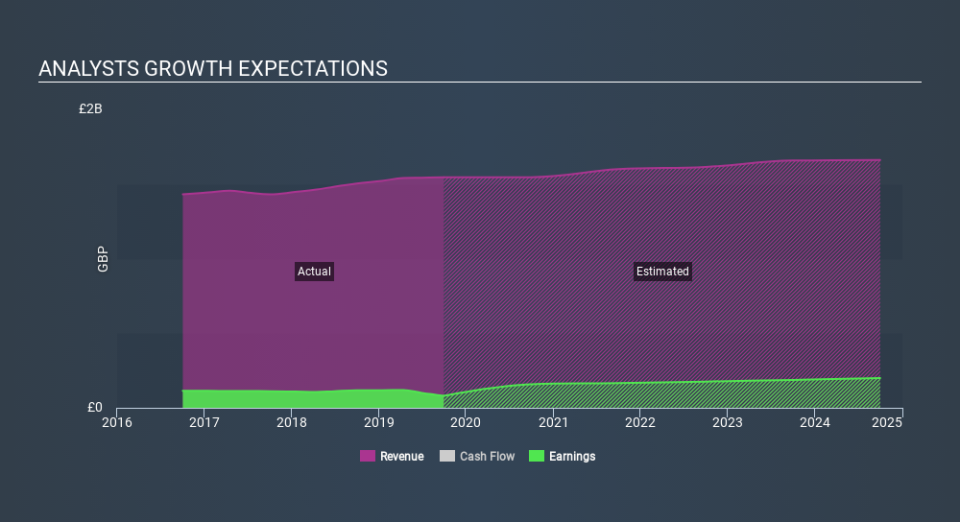Britvic plc Earnings Missed Analyst Estimates: Here's What Analysts Are Forecasting Now

As you might know, Britvic plc (LON:BVIC) recently reported its annual numbers. Earnings per share fell badly short of expectations, coming in at UK£0.30, some 38% below analyst forecasts, although revenues were okay, approximately in line with analyst estimates at UK£1.5b. Analysts typically update their forecasts at each earnings report, and we can judge from their estimates whether their view of the company has changed or if there are any new concerns to be aware of. Readers will be glad to know we've aggregated the latest forecasts to see whether analysts have changed their mind on Britvic after the latest results.
See our latest analysis for Britvic
Following last week's earnings report, Britvic's 13 analysts are forecasting 2020 revenues to be UK£1.55b, approximately in line with the last 12 months. Earnings per share are expected to leap 91% to UK£0.58. Yet prior to the latest earnings, analysts had been forecasting revenues of UK£1.59b and earnings per share (EPS) of UK£0.59 in 2020. The consensus seems maybe a little more pessimistic, trimming their revenue forecasts after the latest results even though there was no change to its EPS estimates.
The consensus has reconfirmed its price target of UK£10.29, showing that analysts don't expect weaker sales expectations next year to have a material impact on Britvic's market value. It could also be instructive to look at the range of analyst estimates, to evaluate how different the outlier opinions are from the mean. The most optimistic Britvic analyst has a price target of UK£11.50 per share, while the most pessimistic values it at UK£9.05. The narrow spread of estimates could suggest that the business' future is relatively easy to value, or that analysts have a clear view on its prospects.
In addition, we can look to Britvic's past performance and see whether business is expected to improve, and if the company is expected to perform better than wider market. It's pretty clear that analysts expect Britvic's revenue growth will slow down substantially, with revenues next year expected to grow 0.05%, compared to a historical growth rate of 3.6% over the past five years. By way of comparison, other companies in this market with analyst coverage, are forecast to grow their revenue at 5.1% per year. Factoring in the forecast slowdown in growth, it seems obvious that analysts still expect Britvic to grow slower than the wider market.
The Bottom Line
The most obvious conclusion from these results is that there's been no major change in the business' prospects in recent times, with analysts holding earnings per share steady, in line with previous estimates. Unfortunately, analysts also downgraded their revenue estimates, and our data indicates revenues are expected to perform worse than the wider market. Even so, earnings per share are more important to the intrinsic value of the business. Still, earnings are more important to the intrinsic value of the business. There was no real change to the consensus price target, suggesting that the intrinsic value of the business has not undergone any major changes with the latest estimates.
With that said, the long-term trajectory of the company's earnings is a lot more important than next year. We have estimates - from multiple Britvic analysts - going out to 2024, and you can see them free on our platform here.
You can also view our analysis of Britvic's balance sheet, and whether we think Britvic is carrying too much debt, for free on our platform here.
If you spot an error that warrants correction, please contact the editor at editorial-team@simplywallst.com. This article by Simply Wall St is general in nature. It does not constitute a recommendation to buy or sell any stock, and does not take account of your objectives, or your financial situation. Simply Wall St has no position in the stocks mentioned.
We aim to bring you long-term focused research analysis driven by fundamental data. Note that our analysis may not factor in the latest price-sensitive company announcements or qualitative material. Thank you for reading.


